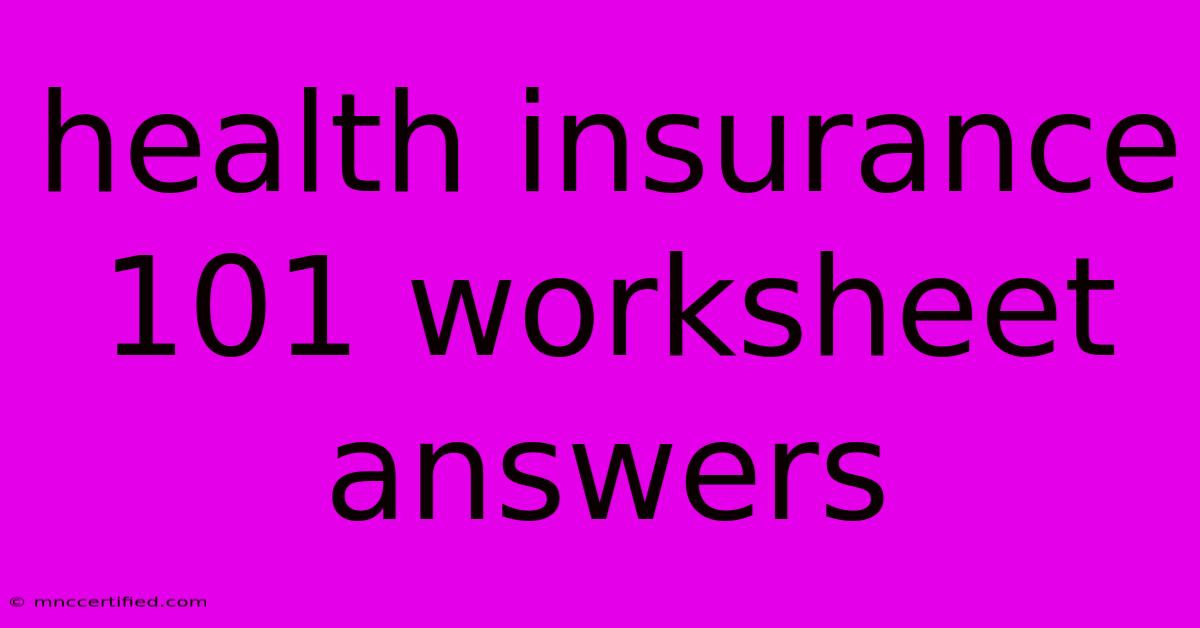Health Insurance 101 Worksheet Answers

Table of Contents
Health Insurance 101: Worksheet Answers and Essential Insights
Navigating the world of health insurance can feel overwhelming, especially if you're new to it. But understanding the basics is crucial for making informed decisions about your health and finances. This guide provides answers to common questions and essential insights for anyone looking to master the fundamentals of health insurance.
1. What is Health Insurance?
Health insurance is a type of insurance that helps you pay for medical expenses. It acts as a financial safety net, protecting you from high healthcare costs in the event of an illness or injury. You pay a premium to your insurance company, and in return, they agree to cover a portion of your healthcare expenses.
2. Key Terms to Know:
- Premium: The monthly or annual payment you make to your insurance company for coverage.
- Deductible: The amount you pay out-of-pocket before your insurance kicks in to cover costs.
- Co-pay: A fixed amount you pay for certain services, like doctor visits or prescription drugs.
- Co-insurance: A percentage of the costs you share with your insurance company after meeting your deductible.
- Out-of-pocket maximum: The maximum amount you'll pay in a year for healthcare costs.
- Network: A group of doctors, hospitals, and other healthcare providers your insurance company has contracts with.
3. Types of Health Insurance Plans:
- HMO (Health Maintenance Organization): Emphasizes preventative care and requires you to choose a primary care physician (PCP) within the network. Referrals are usually needed for specialists.
- PPO (Preferred Provider Organization): Offers more flexibility. You can see providers both in and out of network, but costs are higher for out-of-network care.
- POS (Point of Service): Combines elements of HMO and PPO plans, offering more flexibility while still emphasizing preventative care.
- EPO (Exclusive Provider Organization): Similar to an HMO, but with no coverage for out-of-network care.
- HDHP (High Deductible Health Plan): Offers lower premiums but a higher deductible. Usually paired with a Health Savings Account (HSA).
4. Choosing the Right Health Insurance Plan:
Selecting the right health insurance plan depends on your individual needs and circumstances. Consider the following factors:
- Your health status: If you have pre-existing conditions, you may need a plan with more comprehensive coverage.
- Your budget: Compare premiums and out-of-pocket costs to find a plan that fits your financial situation.
- Your healthcare needs: Think about your typical healthcare utilization. If you use a lot of healthcare services, a plan with lower deductibles and co-pays might be more suitable.
- Your coverage area: Make sure the plan covers the doctors and hospitals you need in your region.
5. Health Savings Accounts (HSAs):
HSAs are tax-advantaged accounts available with High Deductible Health Plans. You can contribute to an HSA and use the funds to pay for eligible medical expenses. The funds roll over year to year and grow tax-free.
6. Open Enrollment:
Open enrollment is a specific period during which you can enroll in or change your health insurance plan. Keep an eye out for open enrollment deadlines, as they can vary depending on your state and employer.
7. Beyond the Basics:
Beyond these core concepts, there's much more to discover in the world of health insurance. Research and understanding specific plan details like coverage limitations, formulary lists (for prescription drugs), and appeal processes can significantly improve your experience.
8. Where to Get Help:
- Your employer: Many employers offer health insurance plans through their workplace.
- The Health Insurance Marketplace: This government-run website offers plans for individuals and families.
- A licensed insurance agent: An agent can help you compare plans and find the one that best meets your needs.
9. Pro Tips:
- Read your plan documents carefully: Make sure you understand the terms and conditions of your plan.
- Ask questions: Don't hesitate to ask your insurance provider or a licensed agent for clarification.
- Track your healthcare costs: Keep track of your expenses to ensure you're maximizing your coverage.
- Stay informed: Keep up-to-date with changes in healthcare policy and insurance regulations.
Conclusion:
Mastering health insurance basics empowers you to make informed choices about your health and well-being. By understanding key terms, plan options, and available resources, you can navigate the healthcare system with confidence. Remember, ongoing research and proactive engagement are vital for staying informed and maximizing your coverage.

Thank you for visiting our website wich cover about Health Insurance 101 Worksheet Answers. We hope the information provided has been useful to you. Feel free to contact us if you have any questions or need further assistance. See you next time and dont miss to bookmark.
Featured Posts
-
Paris Olympics Equestrian Horses Honored
Nov 09, 2024
-
Lurie Humbled Inspired To Lead San Francisco
Nov 09, 2024
-
Breunig V American Family Insurance Co
Nov 09, 2024
-
Friday Night Football Best Bets And Odds
Nov 09, 2024
-
Cavs Vs Warriors Player Grades Clevelands Big Win
Nov 09, 2024